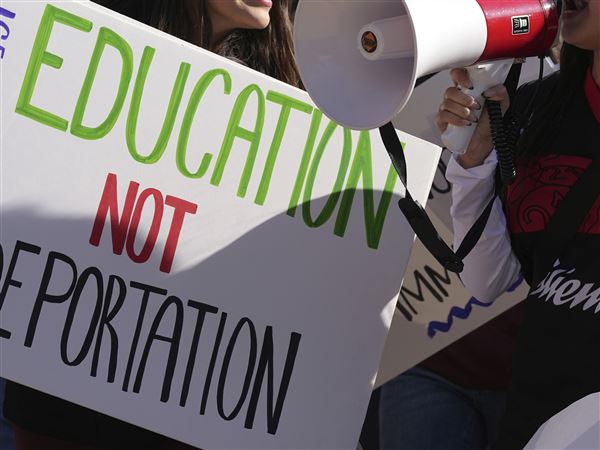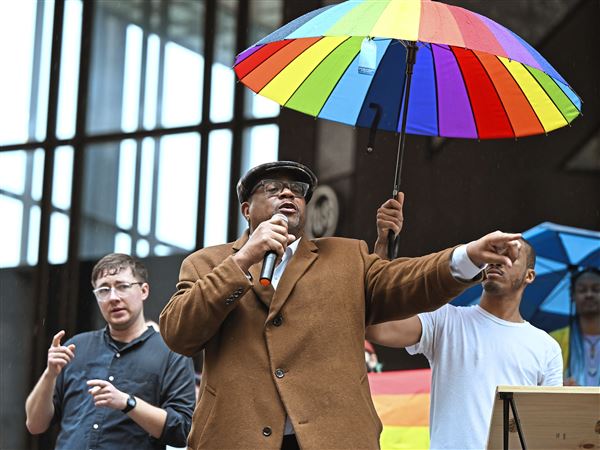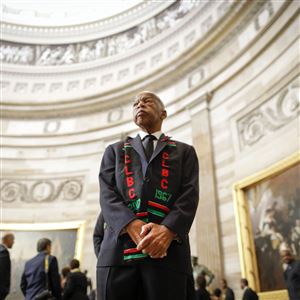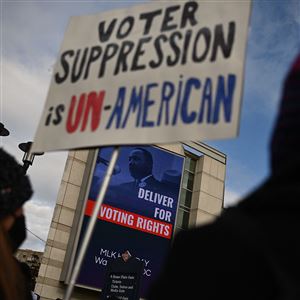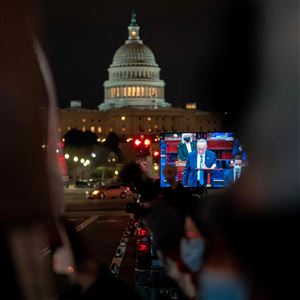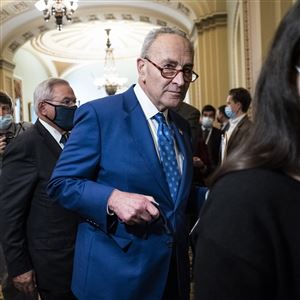WASHINGTON — A year after a mob breached the Senate floor and assaulted numerous law enforcement officers at the U.S. Capitol in an effort to stop the certification of the 2020 election results, U.S. Senate Democrats are highlighting the event as a reason to clear a path for voting rights legislation — even if it means changing the upper chamber’s filibuster rule.
Two Pennsylvania lawmakers are speaking out in support, but the Democratic ranks are not unified on changing a measure historically meant to protect the minority.
Current Senate rules require three-fifths of the chamber to end questions or debate — often strategically lengthy by whichever party is in the minority — on most legislation.
The election and voting rights package at question has been stalled in the evenly split 50-50 Senate, blocked by a Republican-led filibuster with Democrats unable to mount the 60 votes needed to move it toward passage.
In a letter to lawmakers last week, Majority Leader Chuck Schumer, D-N.Y., wrote that “Republicans weaponized arcane Senate rules” last year to prevent action on the bill, and he declared that if the minority party does not engage on the new version of the voting rights legislation, the Senate will “consider” rule changes by Jan. 17.
“We must ask ourselves: if the right to vote is the cornerstone of our democracy, then how can we in good conscience allow for a situation in which the Republican Party can debate and pass voter suppression laws at the State level with only a simple majority vote, but not allow the United States Senate to do the same?” Mr. Schumer wrote, referring to a spate of laws across the nation restricting early voting and mail-in ballot measures, some of which were expanded during the COVID-19 pandemic.
The two election-related bills stalled in the Senate would set a federal standard on voter registration, ballot return and campaign finance, as well as update the criteria for which states and political subdivisions fall under the Voting Rights Act of 1965.
The legislation has been criticized by Senate Republicans, including Sen. Pat Toomey, R-Pa., who accused the opposing party of “dishonest allegations of racially motivated voter suppression.”
“The Democrats’ false narrative is designed to provide the political justification for what they really want to do, which is eliminate the filibuster so they can pass their radical left-wing agenda,” he said in a statement.
While the Senate Democrats overwhelmingly support the bills, two of its members — Sen. Joe Manchin, D-W.Va. and Sen. Kyrsten Sinema, D- Ariz., both co-sponsors of one or both of the voting bills — remain skeptical of quashing the historic rule.
A spokeswoman for Ms. Sinema said the senator “continues to support the Senate’s 60-vote threshold, to protect the country from repeated radical reversals in federal policy which would cement uncertainty, deepen divisions, and further erode Americans’ confidence in our government.”
Ms. Sinema has asked those in support of eliminating the filibuster, “if it would be good for our country to do so, only to see that legislation rescinded in a few years and replaced by a nationwide voter-ID law, nationwide restrictions on vote-by-mail, or other voting restrictions currently passing in some states extended nationwide,” the statement to the Post-Gazette continued.
Mr. Manchin’s office did not respond for comment.
However, two Democratic Pennsylvania lawmakers — Sen. Bob Casey, D-Pa., and U.S. Rep. Conor Lamb, D-Mt. Lebanon, a Senate hopeful — are in favor of breaking the required Senate supermajority, often referred to as the “nuclear option.”
Like Mr. Schumer, Mr. Casey argues that Republican-led state legislatures with support from same-party governors across the country are restricting voting options via simple majorities.
“Why does the Senate have to vote and get 60 votes to provide better pathways to voting, ensuring that mail-in votes can happen, ensuring that older voters can get to the polls or mail in their vote or early vote? It doesn’t make any sense. If none of the them [Senate Republicans] are even going to vote to debate the bill, then we should change the rules,” Mr. Casey told the Post-Gazette.
Mr. Lamb, who is vying for Mr. Toomey’s seat, said the upper chamber “basically doesn’t get any work done now as a result of the filibuster.” Mr. Toomey is not seeking re-election in November.
“I think the most important issue is protecting the right to vote ... so that we don’t lose our democracy, and the filibuster simply can’t stand in the way of those things,” Mr. Lamb said by phone Wednesday. “The filibuster has simply become a way that Republicans stop anything new from happening.”
It’s ‘shortsighted’
That argument is “shortsighted” says Richard Arenberg, a political science professor at Brown University and proponent for keeping the rule in place.
“The filibuster plays an important rule in protecting minorities in the Senate,” Mr. Arenberg said. “It’s important to understand that this is not a partisan issue. It’s easy to get confused about that. As a general rule of thumb, majorities hate the filibuster because it makes it difficult for them to get things that are on their agenda done, and minorities love the filibuster, they support it because it gives them leverage. ... When the gavel changes from one party to the other, so does the attitude about the filibuster.”
He highlighted both parties’ tinkering with filibuster rules to work in their favor — in 2013 under the late Majority Leader Harry Reid, D-Nev., rules were changed to allow simple majority approval on certain executive branch appointees, including cabinet secretaries and federal judges. In 2017 then-Majority Leader Mitch McConnell, R-Ky., cleared the path to reduce the number of votes needed to end debate on Supreme Court nominees.
“It really comes down to this fundamental question of whether or not you think it’s a good thing for a president with a legislative majority to be able to do things without any bipartisan input,” Mr. Arenberg said. “We can look at the state legislatures and see what it means.”
Ending a debate in the Senate was not a given. It wasn’t until 1917 that the body adopted a rule that required two-thirds to end a filibuster. In 1975, the upper chamber reduced that to its current threshold of 60.
The voting legislation is expected to come before the Senate this week, according to Majority Whip Richard Durbin, D-Ill.
The Associated Press contributed. Ashley Murray: amurray@post-gazette.com
First Published: January 9, 2022, 11:00 a.m.

